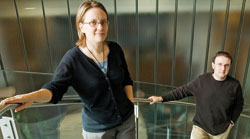Built to last: Engineer couple combine work and life

Rock-solid partnership: Michelle Nokken and Attila Zsaki, seen in the EV building.
Photo by Rob Maguire
Michelle Nokken and Attila Zsaki, assistant professors in the Department of Building, Civil and Environmental Engineering, share a passion — solving engineering problems.
While Zsaki enjoys studying rockslides and mine excavations, Nokken is keen to investigate the deterioration of concrete. Theirs is an unusual dynamic, as they not only share a love for engineering, but also for one another. Nokken and Zsaki met in graduate school at the University of Toronto and are now happily married.
Nokken originally began her studies as an architect but soon heard the call to engineering. Rather than building structures, she had a penchant for studying why they crumble.
“I like investigating things. I’m always looking to see if something is going wrong and why things happen.” Her research involves looking at how to strengthen concrete and prevent it from deteriorating.
Concrete is a mixture of cement, water and aggregates (gravel and sand). Cement is a combination of limestone and clay. The cement blend is heated and ground fine to produce a dried powder that when mixed with water, will harden or “cure” over time.
Other chemicals and natural substances can be added to concrete to provide specific characteristics, e.g., improved curing in cold temperatures, increased elasticity, and enhanced durability. Reinforcing steel is also inserted into some concrete structures to add overall strength.
Nokken’s lab is looking at the value of adding supplementary materials, such as fly ash, to cement.
“Fly ash is an industrial by-product produced by burning coal for electrical power generation. Generally its addition improves the properties of concrete — less permeable to water, and more resistant to deterioration.”
At present, less than 20 per cent of fly ash is added to concrete. Nokken says up to 50 per cent of fly ash can be added, which will improved some aspects of the concrete, and at the same time, solve a major problem of fly ash disposal. Rather than being deposited in a landfill, fly ash can be part of a structure.
Nokken has recently been appointed as the program director for the Building and Civil Engineering Co-op programs, a task she enjoys. She helps direct some 30 students who alternate between academia and the workforce.
The biggest frustration of her job is work placement. Montreal employers stipulate that the students be bilingual. Nokken has had to counsel those who must move away from Montreal and are reluctant to do so, as this poses financial constraint and personal challenges.
“I don’t deal with concrete,” said Nokken’s husband Zsaki, who is interested in the natural elements of soil and rock, also known as geomaterials. Unlike Nokken, Zsaki has always been interested in geomaterials, and the rock collection on his desk is a testimony to his dedication. He combines this focus with skills in computer science to deveop three-dimensional models of rock and soil interactions and movement.
One part of his research concerns the assessment of falling rocks. “Slopes and rocks have the natural tendency to move downwards with gravity.”
He explains that the rate or likelihood of movement is dependent of a variety of factors, such as the angle of the slope, presence of water, vibration from construction equipment, blasting and earthquakes.
A student working with Zsaki is performing three-dimensional modelling of rock falls on mountain highways. She is projecting the path of the rock fall to determine possible collision or impact with a vehicle. The resulting algorithms may help with future construction and road planning.
Zsaki is also using computer imaging to help evaluate stresses around underground excavations, such as mines. “I am always looking to solve problems. In terms of geomechanics, we have a very limited understanding.”
Problem-solving is clearly a strength of this engineering duo. They faced the obstacle of finding work in the same city and now benefit from jobs at the same university and in the same department.
“We enjoy working together. It’s nice to talk about issues. We are fortunate to have both found jobs at Concordia,” Nokken said.